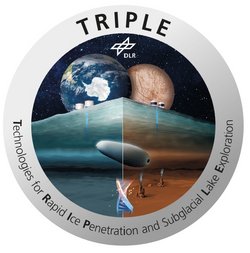TRIPLE-nanoAUV 1
Localisation and perception of a miniaturized autonomous underwater vehicle for the exploration of subglacial lakes
The aim of the TRIPLE project line is to design and build a system for scientific exploration of subglacial lakes while validating the associated functions in close cooperation with marine and space scientists during an analogue demonstration mission in Antarctica. This approach is essential to ensure the applicability and use of the developed TRIPLE system in future terrestrial missions while laying the foundation for a future planetary mission. The interest here is to use this technology in the future to explore oceans in search of extraterrestrial life on other planets and moons, such as on the Jupiter's moon Europa. This moon is particularly interesting as it is believed to provide the three key components for life to exist as we know it: water with a 100 kilometer deep ocean under the icy crust, minerals on its silicate rocky ocean floor, and energy provided by geothermal activities due to tidal forces.
Project details
The TRIPLE system consists of three main components: a semi-autonomous ice-melting probe, a fully autonomous miniaturized diving robot (the nanoAUV) and a highly automated lab for analysis of liquid and sediment samples (the AstroBioLab). The entire system is to be deployed at the end of phase 2 (planned for 2026) in a field test in the Antarctic in the Dome-C region, where the carrier ice-melting probe will melt through the approximately 3.3 km thick ice shield, where will deploy the nanoAUV for the first contamination-free exploration of mankind in one of the multiple underlying subglacial lakes of the Dome-C region. The nanoAUV will perform an exploration in search of scientific points of interest (PoI). When a PoI is found, the nanoAUV will measure, map and take both liquid and sediment samples from the area, before returning safely to the ice-melting probe to hand over the collected data as well as the taken samples. After few explorations runs, the ice-melting probe as well as the nanoAUV, including the taken samples, will return to the surface safely and contamination-free. Up on the surface, the taken samples will then be autonomously analyzed in the AstroBioLab.
In this phase 1 of the TRIPLE project line is investigated which boundary conditions must be fulfilled and how the resulting technical challenges for the achievement of the mission must be overcome. The work will focus on the technical challenges to provide at the end an assessment of the current technical capabilities against the defined mission requirements.
Specifically, DFKI will work together with other partners on the conceptual design and validation of a robust and reliable localization and perception system for the safe execution of the nanoAUV mission taking into considerations critical aspects such as energy requirements, miniaturization and sensor performance.


